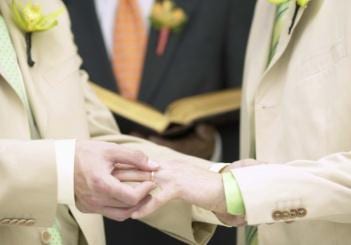England may not recognize their marriage, but Canada now does. Even if they don’t, anymore.
Canadians Wayne Hincks and Geraldo Gallardo have been in the process of divorce for more than a year. The problem is that the government wasn’t sure they were even married because they were joined in a civil union ceremony in the United Kingdom. Gallardo made that argument in court, and – to Hincks’s surprise – Rob Nicholson, Canada’s minister of justice and attorney general, decided to insert himself into the case and agree. Hincks, meanwhile, got the backing of the Ontario attorney general.
Hincks was trying to divide the couple’s shared property and establish spousal support. Gallardo initially entered into divorce proceedings only to withdraw and insist that the two were never married – they were civil partners. That means the Divorce Act doesn’t apply.
The stage was set for a faceoff.
Gallardo and Nicholson’s office argued that Canada couldn’t begin changing the definitions of foreign law – if Hincks wants divorce proceedings, he should file them in England.
In its ruling, the court noted, “[The attorney general of] Canada also says the parties are not married. It points to the conflict of law rule that the validity of a marriage is determined by the place where the marriage was celebrated.”
Furthermore, Gallardo’s lawyer argued, if the court began conferring marital status on civil unions, it would open the floodgates, he said, and soon all civil unions would, by extension, become marriages.
Hincks and Ontario made the case that, under Canadian law, an English same-sex civil union carries all the same tenets of a Canadian marriage. They said it would be discriminatory to rule that the two, who are Canadian citizens, are unable to access Canadian law because they were joined in a place with discriminatory marriage legislation.
In her ruling, Justice Ruth Mesbur wrote that “Canadian law specifically holds that only equal access to marriage for civil purposes would respect same-sex couples’ right to equality without discrimination.
“Failing to recognize this UK civil partnership as a marriage would perpetuate impermissible discrimination.”
Toronto lawyer Adrian Lomaga, chair of the Ontario Bar Association’s sexual orientation and gender identity caucus and a member of Egale’s legal issues committee, told Xtra that the case will have national ramifications and will help clarify the legal state that partners in civil unions find themselves in.
Mesbur did point out, however, that her ruling applied specifically to this case. In this circumstance, Mesbur was able to determine that the two considered themselves married — not just in a civil union — despite Gallardo’s denial. It’s unlikely a judge would make a similar ruling in the case where a couple that’s separating do not consider themselves legally married.
The Ontario attorney-general’s office says it accepts the decision, noting that the court strongly agreed with the attorney general’s arguments. A spokesperson for Rob Nicholson, meanwhile, would not comment on whether Ottawa plans to appeal the case, as they’re still reviewing the decision.


 Why you can trust Xtra
Why you can trust Xtra


